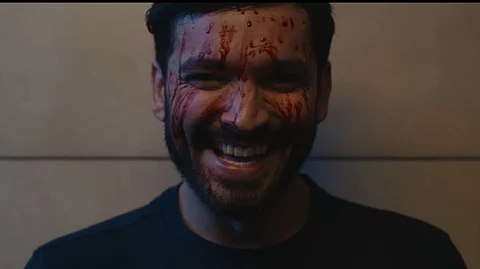

Follow TNM's WhatsApp channel for news updates and story links.
Edagaiye Apaghatakke Karana (Kannada)
A southpaw’s problems are grossly overlooked. From pant zippers to social greetings like the handshake or the high-five, and everything in between, left-handers are forced to operate in a world designed for righties. On top of that, stigmas come attached to using the left hand in the Indian society that forbids its usage for the sake of tradition and auspiciousness. In a way, the left hand is the stepchild of the very body it belongs to, and 33-year-old Lohit (Diganth Manchale), a southpaw himself, knows that to the extent that he believes that his “impure hand” or his edagaiyi is the cause of all his troubles.
But Lohit’s problems aren’t ordinary. If his growing-up days were spent warding off hecklers and jeers, then his adulthood is all about battling his comical misfortune. We are told early on in the film that the same left hand of his brought tragedy along at the time of his birth, and it almost sees his end during a fateful night many years later.
What once seemed like a minor injustice - being disallowed to eat openly with his preferred hand - eventually spirals into something far more ominous; the same limb, treated with suspicion for way too long, becomes the bane of his existence when it matters the most.
For Samarth Kadkol, the writer and director of Edagaiye Apaghatakke Karana, the miseries of his protagonist become a great tool to dispense black humour, and for a good part of his debut feature, he runs with the opportunity. In a manner reminiscent of After Hours (1985), his film kicks off on the potential of a romantic night that eventually descends into madness, and before anyone (or Lohit) knows it, bodies are dropping dead and bizarre mysteries are being revealed without any solicitation.
Lohit, the apple of the eye of this storm, encounters a barrage of characters that cannot be trusted but must be engaged with nevertheless, while his left hand devises plans of its own.
Where Edagaiye Apaghatakke Karana impresses is with its slickness. Samarth Kadkol and his technical crew of cinematographer Abhimanyu Sadanandan, editors Praveen Shivanna and Srikanth, and music composer Praddyottan create a world of whimsy in which each event is carefully positioned and highlighted.
Quirky characters - from an apartment watchman preparing for his civil exams to a cop still in the hangover of a family function he just attended–emerge from all corners to add a layer of amusement and accentuate the setting.
It helps that Diganth Manchale is on top of his game and isn’t asked to try too hard to carry the film on his funny shoulders. Manchale’s comic timing is crisp, and he revels in the company of the rest of the cast, including Dhanu Harsha, Nirup Bhandari, Nidhi Subbaiah, Krishna Hebbale, Sourav Lokesh and others.
At the same time, the film rids itself of any kind of emotional stakes and consequently, the tensions remain low-key throughout. What is triggered on a high note, the story throws up enough surprises to sustain itself during its neat 122-minute runtime, but the need to also dish out comedy relentlessly gets in its way on multiple occasions.
Logical cracks start to show up in the plot that should have otherwise been tightened to such an extent that the characters saw no way out of it. And gradually, the promise of the delectable premise begins to wane, and Edagaiye Apaghatakke Karana finds itself wandering in a bit of a daze in search of a resolution it had prematurely thought of.
Black comedies are generally meant to disclose something unique about human behaviour, and as much as Samarth Kadkol’s film tries to do that, it never really finds a firm footing to make that kind of commentary. It oozes inventiveness but not in its entirety, and the slightly lacklustre parts threaten to take the sheen of an otherwise perky personality. What it needed was a lot more ambition and the conviction to deliver a film devoid of any conventional messaging.
That said, the film is far from being a dud because it manages to utilise its protagonist’s undeniable charm in its favour. It is also refreshing in how it employs its women characters and doesn’t use them as mere placeholders to see its men flourish and take over. Watch the film for goof, gags, and Diganth Manchale’s wholesomeness.
Swaroop Kodur is a freelance film writer, critic, and fledgling filmmaker.
Disclaimer: This review was not paid for or commissioned by anyone associated with the film. Neither TNM nor any of its reviewers have any sort of business relationship with the film’s producers or any other members of its cast and crew.